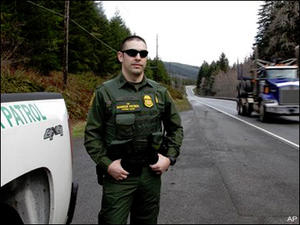 Among the various opportunities to work in law enforcement, the position of border patrol agent offers a number of benefits for future professionals in the field. For any individual who is interested in law enforcement, ensuring the safety of the country, and working in a physically demanding position and sometimes extreme location, a position as a border patrol agent with the U.S. Customs and Border Protection division of the U.S. Department of Homeland Security.
Among the various opportunities to work in law enforcement, the position of border patrol agent offers a number of benefits for future professionals in the field. For any individual who is interested in law enforcement, ensuring the safety of the country, and working in a physically demanding position and sometimes extreme location, a position as a border patrol agent with the U.S. Customs and Border Protection division of the U.S. Department of Homeland Security.
The Role of a Border Patrol Agent
The border patrol agent is an integral part of maintaining the safety and security of the United States. Border patrol agents in the United States work along the eastern coast along the Atlantic Ocean, western coast along the Pacific Ocean, northern border with Canada, or southern border with Mexico. In addition to the search for other illegal materials, border patrol agents are specifically trained to look for the illegal entry of people into the United States.
Some of the daily tasks of agents with border patrol include the monitoring of checkpoints along border areas such as ports and highways and checking vehicles, boats, trains, and other transportation vessels for any suspicious or illegal cargo or passengers. Border patrol agents also conduct anti-smuggling operations, smuggling investigations, and patrol cities and other areas close to the borders. Some of the additional techniques used by border patrol agents include video surveillance equipment and electronic sensors. Border patrol agents might use snowmobiles, motorcycles and four-wheel recreational vehicles, boats, horses, vehicles, and foot patrols.
Training and Education
The Border Patrol Academy is part of the Federal Law Enforcement Training Center. After initial hiring, the future border patrol agents attend the academy in New Mexico for 13 weeks. Much of the training that takes place in the academy is designed to ensure that candidates are physically fit and able to handle the sometimes strenuous tasks required in the field.
Border patrol agents must have an understanding of various areas. While an undergraduate degree is not a requirement, candidates having a minimum of a bachelor’s degree can sometimes forgo the minimum experience requirement. For candidates who have both previous experience and a degree, chances to be considered for a position may be higher.
Some of the knowledge that a relevant degree such as criminal justice can help a prospective agent accumulate includes public safety, security procedures, legal issues, government operations, communication, and criminal and investigative procedures.
Skills and Other Requirements
In addition to physical fitness and the knowledge of the field, there are many skills that are helpful for border patrol agents to possess. These include leadership, ethics, investigation, empathy, social awareness, listening, critical thinking, speaking, coordination, and quick decision making. Also, although not required, speaking another language, particularly Spanish, can be helpful in the application process. A full list of the requirements to be considered for a position as a border patrol agent can be found on the U.S. Customs and Border Protection website.
Related Resource: Toxicologist
With the right skills, training, and knowledge, future law enforcement professionals have a number of agencies and positions to consider when looking for the right career path. An exciting, fast-paced, rewarding position as a border patrol agent could be the perfect fit for a career that has many different tasks and responsibilities.